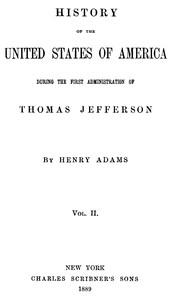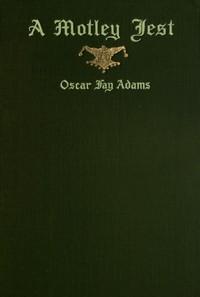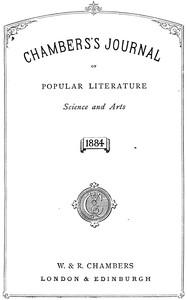Read this ebook for free! No credit card needed, absolutely nothing to pay.
Words: 74034 in 19 pages
This is an ebook sharing website. You can read the uploaded ebooks for free here. No credit cards needed, nothing to pay. If you want to own a digital copy of the ebook, or want to read offline with your favorite ebook-reader, then you can choose to buy and download the ebook.
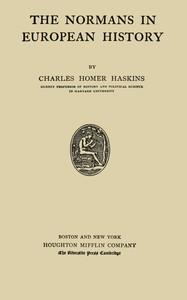

: The Normans in European history by Haskins Charles Homer - Great Britain History Medieval period 1066-1485; Europe History; Normans Europe
INDEX 251
THE NORMANS IN EUROPEAN HISTORY
NORMANDY AND ITS PLACE IN HISTORY
In June, 1911, at Rouen, Normandy celebrated the one-thousandth anniversary of its existence. Decorated with the grace and simplicity of which only a French city is capable, the Norman capital received with equal cordiality the descendants of the conquerors and the conquered--Norwegians and Swedes, Danes of Denmark and Danes of Iceland, Normans of Normandy and of England, of Sicily and of Canada. Four Norwegian students accomplished the journey from their native fjords in an open Viking boat, having set ashore early in the voyage a comrade who had so far fallen away from the customs of his ancestors as to sleep under a blanket. From the United States bold Scandinavians, aided by the American Express Company, brought from Minnesota the Kensington rune stone, which purports to prove the presence of Norse explorers in the northwest one hundred and thirty years before the landfall of Columbus. A congress of Norman history listened for nearly a week in five simultaneous sections to communications on every phase of the Norman past. There was Norman music in the streets, there were Norman plays at the theatres, Norman mysteries in the cathedral close. Banquet followed banquet and toast followed toast, till the cider of Normandy paled before the champagne of France. Finally a great pageant, starting, like the city, from the river-bank, unrolled the vast panorama of Norman history through streets whose very names re?cho its great figures--Rollo and his Norse companions arriving in their Viking ships, the dukes his successors, William Longsword, Richard the Fearless, Robert the Magnificent, William the Conqueror, the sons of Tancred of Hauteville who drove the paynim from Sicily, and that other Tancred who planted the banner of the cross on the walls of Jerusalem, all with their knights and heralds and men at arms, followed by another pageant of the achievements of Normandy in the arts of peace. And on the last evening the great abbey-church of Saint-Ouen burnt red fire for the first time in its history till the whole mass glowed and every statue and storied niche stood out with some clear, sharp bit of the Norman past, while its lantern-tower, "the crown of Normandy," shone out over the city and the river which are the centre of Norman history and where this day the dukes wore again their crown.
In this transitory world the thousandth anniversary of anything is sufficiently rare to challenge attention, even in an age which is rapidly becoming hardened to celebrations. Of the events commemorated in 1915 the discovery of the Pacific is only four hundred years old, the signing of the Great Charter but seven hundred. The oldest American university has celebrated only its two hundred and fiftieth anniversary, the oldest European only its eight-hundredth. Even those infrequent commemorations which carry us back a thousand years or more, like the millenary of King Alfred or the sixteen-hundredth Constantinian jubilee of 1913, are usually reminders of great men or great events rather than, as in the case of Normandy, the completion of a millennium of continuous historical development. So far as I can now recollect, the only parallel is that of Iceland, which rounded out its thousand years with the dignity of a new constitution in 1874. Of about the same age, Iceland also resembles Normandy in being the creation of the Norse sea-rovers, an outpost of the Vikings in the west, as Normandy was an outpost in the south. Of the two, Iceland is perhaps the more individual, as it certainly has been the more faithful to its Scandinavian traditions, but the conditions which have enabled it to retain its early characteristics have also isolated it from the broader currents of the world's history. Normandy, on the other hand, was drawn at once into the full tide of European politics and became itself a founder of new states, an imperial power, a colonizer of lands beyond the seas, the mother of a greater Normandy in England, in Sicily, and in America.
Now the history of Normandy reflects this twofold impression of the traveller: it faces toward England and the sea, but it belongs to France and the land. Open to the outer world by the great valley of the Seine and the bays and inlets of its long coast-line, Normandy was never drawn to the sea in the same degree as its neighbor Brittany, nor isolated in any such measure from the life of the Continent. Where the shore is low, meadow and field run to the water's edge; where it is high, its line is relatively little broken, so that the streams generally rush to the sea down short, steep valleys, up which wheeze the trains which connect the little seaside ports and watering-places with the modern world within. In spite of the trade of its rivers and its ports, in spite of the growth of industry along its streams, Normandy is still primarily an agricultural country, rooted deep in the rich soil of an ancient past, a country of horses and cattle, of butter and cheese and cider and the kindly fruits of the earth; and the continuity of its history rests upon the land itself. "Behind the shore and even upon it," says Vidal de la Blache, "the ancient cumulative force of the interior has reacted against the sea. There an old and rich civilization has subsisted in its entirety, founded on the soil, through whose power have resisted and endured the speech, the traditions, and the peoples of ancient times." Conquered and colonized by the sea-rovers of the north, the land of Normandy was able to absorb its conquerors into the law, the language, the religion, and the culture of France, where, as Sorel says, their descendants now preserve "their attachment to their native soil, the love of their ancestors, the respect for the ruins of the past, and the indestructible veneration for its tombs."
If the character of Normandy is thus in considerable measure determined by geography, its boundaries and even its internal unity are chiefly the result of history. For good and ill, Normandy has, on the land side, no natural frontiers. The hills of the west continue those of Brittany, the plains of the east merge in those of Picardy. The watershed of the south marks no clear-cut boundary from Maine and Perche; the valleys of the Seine and the Eure lead straight to the Ile-de-France, separated from Normandy only by those border fortresses of the Avre and the Vexin which are the perpetual battle-ground of Norman history--Normandy's Alsace-Lorraine! Within these limits lie two distinct physiographic areas, one the lower portion of the Paris basin, the other a western region which belongs with Brittany and the west of France. These districts are commonly distinguished as Upper and Lower Normandy, terms consecrated by long use and representing two contrasted regions and types, but there is no general agreement as to their exact limits or the limits of the region of Middle Normandy which some have placed between them. Even the attempt to define these areas in terms of cheese--as the land respectively of the creamy Neufch?tel, the resilient Pont-l'?v?que, and the flowing Camembert--is defective from the point of view of geographical accuracy!
Lower Normandy shows greater variety, comprising the hilly country of the Bocage,--the so-called Norman Switzerland,--the plain of Caen and the pasture-lands of the Bessin, and the wide sweep of the Atlantic coast-line, from the promontory of La Hague to the shifting sands of the bay of Mont-Saint-Michel. It is a country of green fields and orchards and sunken lanes, of dank parks and mouldering ch?teaux, of deserted mills and ancient parish churches, of quaint timbered houses and long village streets, of silent streams, small ports, and pebbly beaches, the whole merging ultimately in the neighboring lands of Brittany and Maine. Its typical places are Falaise, Vire, and Argentan, with their ancient castles of the Norman dukes; Bayeux and Coutances, the foundations of whose soaring cathedrals carry us back to the princely prelates of the Conquest; provincial capitals of the Old R?gime, like Valognes, or the new, like Saint-L?; and best of all, the crowning glories of the marvel of Mont-Saint-Michel. Its chief town is Caen, stern and grey, the heart of Normandy as Rouen is its head, an old poet tells us; no ancient Roman capital, but the creation of the mediaeval dukes, who reared its great abbey-churches to commemorate the marriage and the piety of William the Conqueror and Matilda, and who established their exchequer in its castle; an intellectual centre also, the seat of the only Norman university, of an academy, and of a society of antiquaries which has recovered for us great portions of the Norman past.
The race of the Normans is unconquered and ready for any wild deed unless restrained by a strong ruler. In whatever gathering they find themselves they always seek to dominate, and in the heat of their ambition they are often led to violate their obligations. All this the French and Bretons and Flemings and other neighbors have frequently felt; this the Italians and the Lombards, the Angles and Saxons, have also learned to their undoing.
A little later it is the Norman poet Wace who tells, through the mouth of the dying William the Conqueror, of these same Normans--brave and valiant and conquering, proud and boastful and fond of good cheer, hard to control and needing to be kept under foot by their rulers. Through all these accounts runs the same story of a high-spirited, masterful, unscrupulous race, eager for danger and ready for every adventure, and needing always the bit and bridle rather than the spur.
The contrast is not merely between the eleventh century and the twentieth, between a lawless race of pioneers and a race subdued and softened by generations of order and peace; the two types are present in the early days of Norman history. Among the conquerors of England a recent historian distinguishes "the great soldiers of the invading host ... equally remarkable for foresight in council and for headlong courage in the hour of action, whose wits are sharpened by danger and whose resolution is only stimulated by obstacles; incapable of peaceful industry but willing to prepare themselves for war and rapine by the most laborious apprenticeship"; and over against them "the politicians ... cautious, plausible, deliberate, with an immense capacity for detail, and an innate liking for routine; conscious in a manner of their moral obligations, but mainly concerned with small economies and gains; limited in their horizon, but quick to recognise superior powers and to use them for their own objects; indifferent for their own part to high ideals, and yet respectful to idealists; altogether a hard-headed, heavy-handed, laborious and tenacious type of men."
These contrasting types of life and character it is tempting to refer to the respective influences of land and water, to the differences between the peasant and the rider to the sea. One might even attempt a philosophy of Norman history somewhat on this wise. In its normal and undisturbed state Normandy is a part of France, in its life as in its geography, and as such it shows only the ordinary local differences from the rest of the French lands. So it was under the Romans, so under the Franks. At the beginning of the tenth century the coming of the Northmen introduces a new element which develops relations with the sea and the countries beyond the sea, with Scandinavia and later with the British Isles. Normandy ceases to be provincial, it almost ceases to be French; it even becomes the centre of an Atlantic empire which stretches from Scotland to the Pyrenees. It sends its pilgrims to Compostela, its chivalry to Jerusalem, its younger sons to Sicily and southern Italy. Its relations with the sea do not cease with its political separation from the lands across the Channel in 1204. The English come back for a time in the fifteenth century; the Normans cross the Atlantic in the sixteenth and settle Canada in the seventeenth. But the overmastering influence of the soil prevails and draws its children back to itself. The sea-faring impulse declines; activity turns inward; the province is finally absorbed in the nation; Normandy is again a part of France, and the originality and distinctness of its history fade away in the life of the whole.
Free books android app tbrJar TBR JAR Read Free books online gutenberg
More posts by @FreeBooks

: Stepping stones to manhood by Pearce William Peter - Boys Conduct of life; Young men Conduct of life
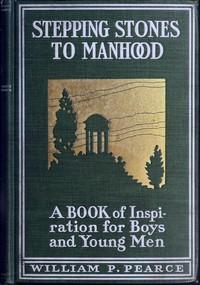

: History of the United States of America Volume 2 (of 9) by Adams Henry - United States History 1801-1809; United States History 1809-1817
